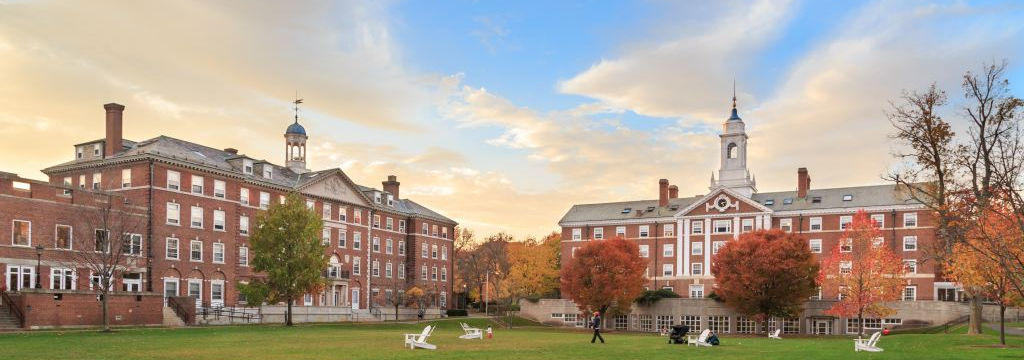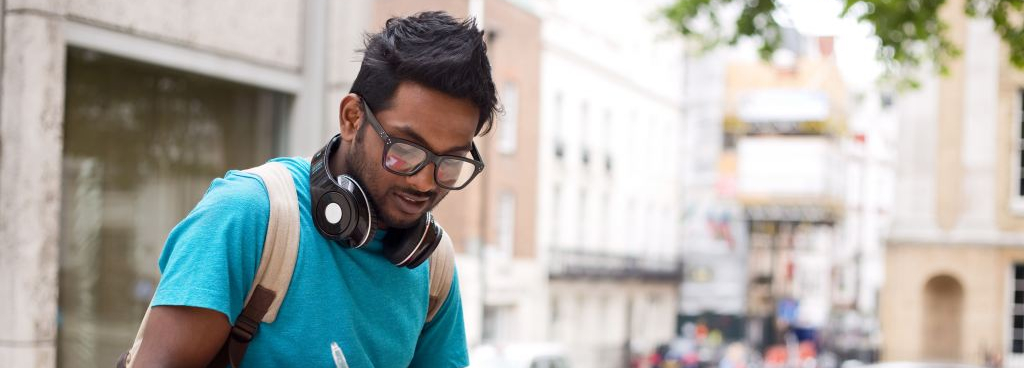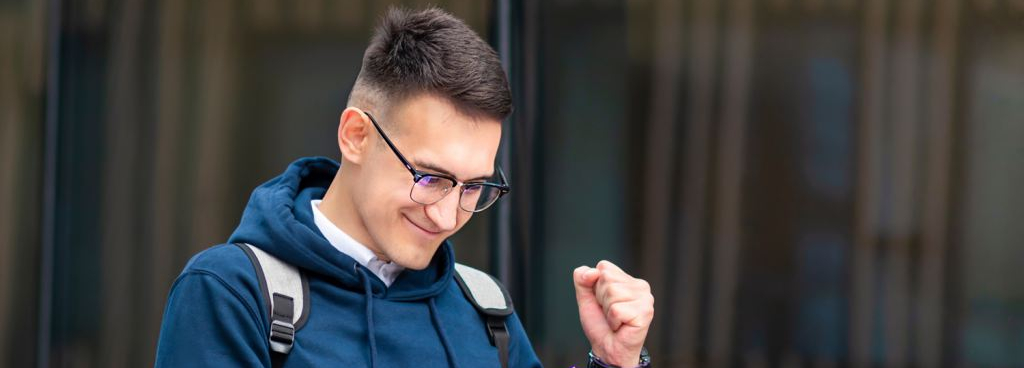The University of Pennsylvania — or Penn, as it’s often referred — offers interviews to prospective students. Depending on volunteer availability, Penn may reach out to you to schedule an Alumni Conversation. This is essentially a conversation between you and an alum so that you can learn a little more about Penn and they can learn a little more about you.
Not every applicant is offered the opportunity to meet with an alum, so it’s important to take advantage of this interview as much as you can. Read on to learn how to stand out in your Alumni Conversation so you can present yourself in the best light possible.
What Are UPenn Interviews Like?
The University of Pennsylvania interview lasts roughly 20-45 minutes and is a conversation between you and an alum. You’ll be meeting with a former Penn student, so this is a great opportunity to ask any questions you may have about campus culture, their experience attending the university, and more personal questions. Make sure to personalize the experience — if you’re simply asking about student-to-faculty ratio, class sizes, or other information you can simply find on the university’s website, you won’t make a great impression.
As for talking about yourself — while it can be tempting to be modest during an interview, this is not a time to be humble! Talk about major accomplishments you’ve achieved, obstacles you’ve faced (and overcome!), and anything else that you’re proud of. Make sure to highlight your background, ambitions, and goals and how they would relate to an education at Penn.
You should aim to have a relaxing and comfortable conversation with your interviewer. Look for common interests or experiences to break the ice. Most importantly, do your research! The best way to stand out is by talking about what Penn specifically offers that you’re most excited about, how you would take advantage of their unique programs and offerings, and how you believe you can contribute to the university’s community.
Are All UPenn Applicants Interviewed?
Not all Penn applicants will be offered an interview. After all, these conversations take place with alumni and are based on volunteer availability. As such, applicants cannot request an interview. If you’re offered an interview, be sure to take advantage of it! And if you’re not, rest assured, this will not negatively impact your application.
Learn more about how to get into Penn.
Will a Penn Interview Help Your Application?
Interviews are always advantageous! They offer a unique opportunity to learn more about the university firsthand and for them to learn more about you. If you get lots of sleep the night before, do your research, and come prepared, you’ll be sure to have a positive experience!
How Long Is the UPenn Interview?
You can expect your interview to last roughly 20-45 minutes. Alumni are busy people and are often pressed for time, so don’t sweat it if your interview is on the shorter end of that range. Likewise, if you mesh really well with your interviewer or have lots of questions, it may last a little longer!
What Is the Significance of the UPenn Interview?
After an interview, the alum will submit a summary of your conversation to the admissions committee, who will then add it to your application. The admissions officers will use information to get to know you better when considering your application.
Where Do UPenn Interviews Take Place?
Alumni Conversations will be held virtually for the 2023-24 admissions cycle. Make sure to choose a quiet place to take this call. Remember, you will likely be on video, so be sure to still dress professionally, log on a few minutes early to check you have a tidy background and good lighting, and to check your internet connection is stable enough to support a video call. Alumni aren’t expecting a 4K experience, but it will help if you don’t freeze midway through the conversation or have anything distracting in your background.
UPenn Interview Questions: What Classes, Programs, and Activities on Penn’s Campus Are Exciting to You?
Think of this question as the “Why This College?” supplemental essay question. Here, the interviewer is hoping to learn what specifically drew you to Penn. Remember, the alum won’t have access to your application, so you may need to reiterate a few points you mentioned so as to provide context.
For example, if you’re a STEM student, be sure to mention your desired major before launching into a discussion about the biology professor you hope to research with. If you’re athletic in your spare time, don’t forget to let the alum know before professing your love for the flag football team.
Check out our sample answer to this question below.
How to Answer This Interview Question
While I haven’t picked a major yet, I’m considering anthropology or English — potentially even double majoring — so I’d love to take advantage of courses that combine those two subjects. As an avid reader, one of my favorite genres is fiction, particularly Asian literature and all of the supernatural elements that emerge. Penn’s course on Demonic Women in Japanese Fiction sounds particularly fascinating, and I’d love to learn more about the political microcosms behind branding women as such sinister figures.
The Gods, Ghosts, Monsters course also really appeals to me, as the description mentions studying murals, manuscripts, and even comic books through an anthropological and literature lens. These courses definitely seem like a great place to start, especially considering my love for learning about the supernatural!
In fact, I’m even considering taking advantage of Penn’s Individualized Major option to create my own major about supernatural narratives in cross-cultural literature, so these courses would really help solidify that choice. Other than classes, I visited the Penn Museum during my college visit and hope to volunteer or maybe even work there part-time. Not only would that be a dream campus job, but I’m also hoping this will give me some good experience to research with Professor Tartaron. I loved reading his 2013 publication “Maritime Networks in the Mycenaean World,” as it was so interesting to learn about how geography can impact an entire culture’s lifestyle.
As for clubs, some that are at the top of my list to join are Community School Student Partnerships and Pan-Asian Dance Troupe since they’re both about teaching, learning about, and sharing culture. I also would love to join Penn Reads Book Club and also the Social Deduction Club since escape rooms and murder mystery parties sound like so much fun!
This student has just told the interviewer a lot about themself: they love to read and learn about different cultures, which supports their passions for literature and anthropology. They’re also fascinated by the supernatural, which may give them good grounds to create their own major. Finally, they’ve clearly done their research about Penn: they cited specific Penn courses they would like to take, clubs they would like to join, and even a professor they’d like to research with, as well as additional plans to get involved on Penn’s campus through their museum. Each of these elements demonstrate how this student would take advantage of Penn’s unique opportunities whilst on campus.
UPenn Interview Questions: What Draws You to the Undergraduate School/Program to Which You’ve Applied?
This is another question that you can pull from elements in your application. As we said before, the alum you will be speaking to hasn’t read your application, so it’s important to give them context — but also be sure to expand upon your answer in a way that you may not have had the opportunity to do in your application due to word count, for example. Remember, the alum will be handing over their notes to the admissions committee so that they can get a better picture of you, so it’s important to not be too repetitive.
IvyWise Principal College Admissions Counselor and Former Admissions Officer at the University of Pennsylvania, Danielle, shares her tips for addressing this question: “We look really closely at that Penn supplement to make sure that you are identifying why one of the four colleges at University of Pennsylvania is a good fit for you. There shouldn’t be any copying and pasting from one college essay to the next or writing a general essay that could fit for any of the four schools at Penn.”
Danielle’s tip can easily be applied to answering the interview question, as outlined below.
How to Answer This Interview Question
First, keep the answer specific to Penn — plenty of schools offer a College of Arts & Sciences, for example, so what is it about Penn’s College of Arts & Sciences that drew you to apply? Next, be sure to get even more specific when discussing the college you’re applying to — cite specific examples about the college rather than talking about Penn as a whole. Discuss why you’re interested in pursuing the undergraduate school/program you applied to and, more specifically, why you want to pursue that education at Penn.
Check out our sample answer to this interview question below.
I applied to the School of Arts & Sciences because while I haven’t picked a definitive major yet, I know I want to major in either anthropology or English — maybe even both! Both departments offer some unique and fascinating courses, and their professors are equally as impressive. I truly believe this college will provide a solid foundation for me to explore concentrations uniquely catered to my interests.
So far, I’ve been really drawn to the Cultural & Linguistic Anthropology and the Literary Theory & Cultural Studies concentrations. I love how versatile each one is, both allowing me to deepen my understanding of each topic whilst also broadening my horizons to explore the full extent of a liberal arts education. I would also love the option to explore a few Penn Global Seminars. Their shorter duration would allow me to visit more places and study more cultures up close than I would be able to by studying abroad for a semester — let alone for a year. Plus, there are so many fascinating options to choose from! In particular, the Korean Language & Culture; Sacred Stuff: Religious Bodies, Places, and Objects in the U.K.; Scientific Nationalism in Japan; and Seeing/Hearing Globally Indigenous Music and the Arts of Healing in Australia are just some of the many Global Seminars offered by the School of Arts & Sciences that I think would contribute to a well-rounded liberal arts education at Penn. These are courses that aren’t offered at any other university, so I’m especially excited to be able to supplement a concentration in Cultural & Linguistic Anthropology or Literary Theory & Cultural Studies with the knowledge I will have gained from those trips!
In addition to my studies, the College of Arts & Sciences also has a strong network of advisors to help me hit the ground running both during my studies and after graduation. A support network is especially important to me since my interests are both very broad and yet very niche, so I would love some advice on how to use my potential major in the real world. I fully plan to take advantage of Ben Connect so I can connect with Arts & Sciences alumni to get an idea firsthand of what a career in this field would look like, learn about their experiences, and get other anecdotal advice.
This student has now elaborated on their passions for anthropology even further and was able to dive deeper in their explanation for their choice than they would have been able to in their application. Not only did they highlight some concentrations they’d be interested in pursuing, but they also touched on some other programs uniquely offered by Penn, like Penn Global Seminars and Ben Connect. They were able to relate each of these opportunities to the School of Arts & Sciences and demonstrate the significance each would offer them. They made sure to balance answering why they’re interested in an education in the Arts & Sciences while also answering why they’re interested in Penn’s College of Arts & Sciences in particular. Keep these tips in mind if you’re asked this question in your interview!
UPenn Interview Questions: How Do You Spend Your Time When You’re Not in School?
The ball is in your court with this question! It offers an opportunity to dive even deeper into your personality so that Penn can get an idea of who you are beyond just your academic interests. You could probably go on and on about what interests you, but remember, the interview is only 20-45 minutes long. A strong answer will be concise: the interviewer doesn’t need to know about how you watch Ping Pong tournaments with your dad once a month. Instead, focus on the day-to-day or how you spend your weekends.
How to Answer This Interview Question
Make sure to discuss your hobbies as well as your extracurricular activities — while the interviewer may not know about your extracurriculars, the admissions committee they send their notes to will already have an idea about this. So, highlight how you spend your free time — and more importantly, how that relates to your interests, both academic and personal.
This sample answer may help generate some ideas:
My favorite pastime is reading — I like to set aside a couple hours each day for outside reading. It helps me wind down each night, especially on the days I have Dance Club! I’m the president of Dance Club and make it our mission to learn a different dance style each month, so one month it will be salsa and the next, swing. I coordinate bringing in an expert once a week for that month so we can not only learn the style, but also learn about its history and origins, which I feel is very important! On weekends, I tutor French and I’m hoping to be able to tutor some of the kids at my local church over the summer, too. Lastly, I also try to spend a few hours outside every weekend, so I like to do this by helping out my neighbors with yard work, little errands, and by walking their dogs after church. It gives them a chance to relax and gives me a breath of fresh air — plus, I love dogs! Over the summer, I volunteer at our local rescue. It’s great because I get to play with the dogs and teach them tricks that will make them more adoptable, all while helping find them new homes!
Here, the student has reiterated their love of reading and passion for learning about various cultures, while also establishing more about themselves that otherwise might not be found in their application. They introduced an interest in dance and dogs as well as some context about their background and values: they love to help out their neighbors and other students. Make sure to consider some of the ways you, too, can tie your answers to both your passions and values.
UPenn Interview Questions: Can You Tell Me a Little About Yourself?
This is the question many students struggle with the most. Where to begin? The key to answering this question is including relevant and important information without rambling or boring your interviewer.
How to Answer This Interview Question
Our best tip for answering this question concisely is to introduce a little about your background, how it made you who you are today, and how it may have defined/guided your interests. Let’s take a look at how our sample student responds.
I’m very extroverted, but I didn’t always used to be this way. I grew up in Michigan and as a huge bookworm, I mostly kept to myself when I was younger. That changed when I wound up spending a few years studying in the U.K. after my dad got relocated there for work. Given its close vicinity to many European countries, I was able to travel a lot during school breaks, which is what fostered my love for learning about other cultures. It also made learning French much easier, since I was surrounded by native speakers in school!
When I moved back to the U.S., I developed a bit of culture shock. I felt really isolated by the lack of public transportation, especially living in rural Michigan. It was much more difficult to take a day trip into the city or see my friends on weekends, especially since I only had a British driver’s license at the time, not an American one. This is actually what sparked my love of dance, as I joined the Dance Club to spend more time with my friends outside of school. It’s also what encouraged me to start attending church more regularly and make an effort to really get to know my neighbors — which ultimately led to walking their dogs and volunteering at the rescue — as well as other students at my school that I didn’t otherwise get to interact with. My experiences moving to the U.K. and back to the U.S. again really helped shape me into the social butterfly that I am today!
Now, we’re getting a more complete picture of this student: they’ve introduced us to their background and what has shaped them into the person they are today, as well as what has helped spark their various interests and activities along the way. This student kept their answer concise, but helped paint the bigger picture for the interviewer, all while keeping each piece of information relevant to answering the question.
UPenn Interview Questions: What’s Important to You?
While getting good grades and keeping up with the World Cup may be important to you, this question is tailored more towards social justice, current events, or other big issues. The goal of the interviewer is to get to know more about your passions outside of school and what makes you tick.
How to Answer This Interview Question
If nothing immediately comes to mind, think about the last news story you read that got you fired up, or a conversation you had that may not have sat well with you. Maybe think about a time you really wanted to help someone or some group of people. Are there any themes you can identify? While you brainstorm, check out our sample answer:
Something that’s extremely important to me is respect, whether that’s respecting someone’s background, political ideas, or some other aspect about them or their ideas. I don’t think everyone inherently has to agree with each other, but it’s important to be able to listen when having a conversation or debate rather than just talking over one another. I try to be as respectful as possible in my everyday life, whether that’s striving to learn more about a dance’s origins when I introduce a new style to Dance Club or having a conversation about something political with someone who disagrees. For example, one of my neighbors doesn’t believe in climate change. When we debate about the impact of littering or letting a car idle for too long, I try to be respectful of her opinions before voicing my own — even when I disagree.
Not only have we learned this student cares deeply for the environment and sustainability, but we also get to know them better as a person. They value respect, which also translates to their reasoning for bringing in experts to their Dance Club. When answering this question, think about how your own beliefs and values impact your everyday life and how you interact with the world.
UPenn Interview Questions: What Are Your Current Academic And/or Extracurricular Interests?
Depending how your interview goes, you may have already answered this through other questions — in which case, an interviewer may opt to omit this question. In the case they ask you this anyway, try to provide some new information so that your answers don’t get repetitive. If you haven’t discussed your academic or extracurricular interests yet, however, then keep them relevant. The interviewer doesn’t need to know about the robotics club you joined for one semester four years ago!
How to Answer This Interview Question
Be sure to tie any academic or extracurricular interests you mention to the larger picture. It’s important to only bring up relevant information. This isn’t a long interview, so focus on what interests define you rather than the occasional passion project. Let’s hear from a different sample student this time, so we can get an idea of how to answer the question from someone that hasn’t already explored their interests in depth:
Growing up, I was always obsessed with crime shows like NCIS and CSI, but I couldn’t really find much to explore this interest outside of just binge watching TV. One of my favorite subjects is biology, but we don’t really get to dive into criminology or other subjects outside of life and environmental sciences, so I ended up starting the Forensic Analysis Club. We dust for fingerprints, study our hair and blood under the microscope, and even learn how to extract DNA from our saliva! I’m also in Book Club, so one month when we were reading a murder mystery, we facilitated a group activity to reenact the plot of the book. It was really fun and was a great way to put our forensic skills to the test! The members of Book Club acted as characters from the story and the members of the Forensic Analysis Club had to solve the case. My job was working with my biology teacher to figure out how to incorporate forensic clues. My biology teacher was so much fun to work with, and now I’m pursuing an independent project about DNA analysis with her. It’s definitely my favorite subject at the moment! I also take karate on the weekends. I think everyone should learn some level of self-defense. Karate allows me to do this, which may come in handy when I pursue a career in criminology — you never know what could happen! — while also having fun with my friends. As an added bonus, I feel like I can relate to my favorite characters more, like those from “Cobra Kai,” the “Karate Kid” movies, and even “Fight Club!”
While this answer may have been a little more detailed than the interviewer was probably looking for, the interviewer has not only learned that this student has a love for criminology and forensic science, but also that they’re a cinephile and love to read! Even if this student’s extracurriculars and martial arts background are reflected in their application, the admissions committee now has another key aspect of their personality that the student probably didn’t have room to expand upon in their application.
How to Prepare for a UPenn Interview
Preparation is the key to a successful interview. Additionally, you will feel more confident on the day of the interview if you take the time to prepare, especially if you follow these tips.
Present It as the #1 Institution on Your List
One of our top college interview tips is to demonstrate your enthusiasm for the school throughout the interview. Penn wants to ensure you’ll attend if accepted, so be sure to mention what specifically excites you about Penn that no other university can offer and highlight how you’ll take advantage of this if you’re accepted.
Research the School
Do your research and come prepared with questions that can’t easily be answered on Penn’s website. The same goes for answering questions. Penn wants to know what drew you to apply to their university, so get specific with your answers. Don’t just talk about a club or class that can be found at any other university.
Likewise, don’t cite the university’s status as an Ivy League or their rankings as the reason behind your choice. Plenty of people apply to Penn because it’s an elite university; you want to stand out and prove you’ve thoroughly researched the school and are confident it’s a good fit for you — and that you are for it.
Want the insider scoop on Penn? Sign up for our free webinar, IvyWise Live: A Look Inside UPenn with Former Admissions Directors.
Tell Your Story
Just as it’s important for you to get to know Penn during the Alumni Conversation, it’s also important for the school to get to know you. This isn’t a time to be humble! If you’re proud of an accomplishment that would differentiate you from other applicants, say so. If you have a unique background or story that’s just waiting to be told, this is the time to do it.
Just be careful to not be redundant from your application. While you may need to repeat some context clues for the interviewer, their notes will ultimately be sent to the Admissions Committee. If the entire interview is just a regurgitation of your application, this won’t add much value.
Prepare Insightful Questions
Chances are, the alum interviewing you has interviewed many other applicants before you, too, and are probably tired of answering the same questions over and over again — especially when their answers can easily be found online.
Try to get creative with your questions, instead. Ask about your interviewer’s experience at Penn, the campus culture, what they wish they knew about while at Penn — whether that’s a class, club, professor, or something else — and other tips they have about attending the university.
Remember, this interview is a conversation and the alum is being interviewed as much as you are. Take advantage of your time with a former student to truly dive into whether Penn is the best fit for you.
Questions to Ask Your UPenn Interviewer
Need help brainstorming questions to ask your Penn interviewer? These questions are a good place to start:
- What were your favorite on-campus activities at Penn?
- Which class was your favorite?
- What professor was your favorite?
- Are there any student programs or clubs you highly recommend?
- Which classes did you take outside of your major/requirements? Do you recommend them?
- What was your favorite aspect about campus? The Penn Museum? Penn’s location? A particular dining hall?
- What resource do you wish you knew about or took more advantage of during your time on campus?
- How was the transition to the workforce after you graduated? What career support systems from Penn do you most recommend taking advantage of?
The interview is a chance for you to really stand out to the admissions committee and for them to learn more about you that they can’t otherwise glean from your application. It’s important to take advantage of this opportunity and come prepared so that you can present yourself in the best light possible. For even more college interview tips, check out our Just Admit It! podcast to learn how students can prepare for admissions interviews.




